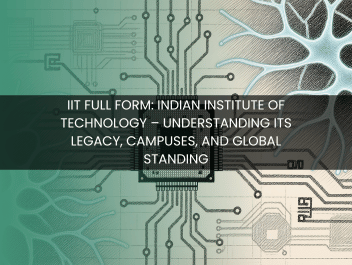
Exploring Top Engineering Branches After 12th: A Comprehensive Guide
In today's competitive world, choosing the right career path after 12th grade is crucial, especially for students inclined towards engineering. With an array of engineering courses after 12th available, making an informed decision becomes essential to ensure a prosperous future. Navigating through the engineering courses list after 12th and understanding various engineering options after 12th can be daunting but vital.
Engineering courses after 12th science not only open doors to a plethora of opportunities but also promise lucrative salary prospects. Understanding the eligibility criteria for B Tech courses after 12th and preparing for entrance exams like JEE Main and BITSAT are critical steps for aspiring engineers. Moreover, emerging fields like Artificial Intelligence and Data Science are revolutionizing engineering lines after 12th science, offering new horizons and challenging career paths.
This comprehensive guide delves into the world of b tech courses after 12th science, exploring top engineering branches, career prospects, and the significance of aligning courses with career goals. From examining entrance exams to assessing salary expectations in engineering courses after 12th with salary insights, this article aims to equip readers with the knowledge needed to make informed decisions for a successful engineering journey.
Table of Content
- 1. Understanding the Importance of Choosing the Right Engineering Branch
- 2. Eligibility Criteria for BTech Courses in 2025
- 3. Overview of Entrance Exams
- 4. Popular Engineering Specializations
- 5. Career Prospects and Salary Expectations
- 6. Top Engineering Colleges in India
- 7. NIRF Rankings and Their Impact
- 8. Choosing the Right Engineering Course
Understanding the Importance of Choosing the Right Engineering Branch
Selecting the right engineering branch after the 12th is crucial for a successful career. With various engineering courses after 12th, like B Tech, it's vital to weigh your interests and career goals.
Consider the following popular engineering lines after 12th science:
- Mechanical Engineering: This deals with mechanical systems and is perfect for those curious about design and manufacturing.
- Civil Engineering: Ideal for students fascinated by construction and infrastructure development.
- Electrical Engineering: Focuses on electrical systems, catering to those interested in electronics and power generation.
- Computer Science Engineering: Offers opportunities in software development and IT solutions.
- Chemical Engineering: Combines chemistry with engineering to create new materials.
To aid decision-making, here's a brief comparison of common engineering options after 12th science:
|
Branch |
Average Starting Salary (Annually) |
|
Mechanical Engineering |
$58,000 |
|
Civil Engineering |
$56,000 |
|
Electrical Engineering |
$60,000 |
|
Computer Science |
$70,000 |
|
Chemical Engineering |
$62,000 |
Choosing the right engineering courses after 12th can set you on a path to a successful career, combining your passion with technical skills.
Eligibility Criteria for BTech Courses in 2025
Pursuing BTech courses after 12th is a popular choice for many students interested in engineering courses after 12th science. To be eligible for BTech courses in 2025, students must meet certain requirements.
- Educational Qualification: Aspirants must have completed 12th grade with science stream subjects, specifically Physics, Chemistry, and Mathematics (PCM).
- Minimum Marks: Candidates are typically required to secure at least 50% marks in their 12th examinations. Some top engineering colleges may demand higher scores.
- Entrance Exams: Most prestigious institutions require scores from entrance exams like JEE Mains and JEE Advanced. These tests assess the aspirant's technical skills and understanding of engineering principles.
- Age Limit: Generally, there is no upper age limit for most entrance exams, but certain institutes might have specific age criteria.
- Additional Requirements: Some private colleges might have their admission tests or interview processes.
To explore different engineering lines after 12th science, candidates should research the engineering options after 12th to align with their career goals. With a wide range of b tech courses after 12th science available, choosing the right path can lead to a successful career in diverse fields like Mechanical, Civil, or Aerospace Engineering.
Overview of Entrance Exams
Embarking on engineering courses after 12th, especially b tech courses after 12th science, often requires navigating a series of entrance exams. These exams play a critical role in determining admission eligibility for various engineering institutes. They assess critical technical skills and knowledge integral for a career in technology. With a broad spectrum of exams available, from national to state level, students have diverse pathways to engineering courses after 12th science. Understanding the unique aspects of these exams helps in making informed decisions regarding engineering options after 12th.
JEE Main and Advanced
The Joint Entrance Examination (JEE) Main and Advanced are pivotal for students aiming for premier engineering colleges, like the IITs. These exams are a testament to a candidate's grasp over fundamental engineering principles and problem-solving skills. JEE Main is the first step, which filters candidates for JEE Advanced. Successful candidates of JEE Advanced can secure admission in top-tier institutes, shaping their engineering lines after 12th science into illustrious careers. A solid performance in these exams underscores a deep understanding of technical knowledge pivotal for fields like Mechanical Engineering or Electrical Engineering.
BITSAT
BITSAT, or Birla Institute of Technology and Science Admission Test, is another prestigious route for engineering aspirants. This online test is conducted by the Birla Institute of Technology and Science, one of India's leading private universities. Designed to evaluate a student's proficiency in subjects like Physics, Chemistry, and Mathematics, BITSAT also tests logical reasoning skills, which are essential for a successful career in engineering. As a competitor to national level exams like JEE, BITSAT offers its own unique engineering courses list after 12th, providing diverse opportunities in specialized fields like software development and biomedical engineering.
State-Level Tests: KCET and WBJEE
State-level entrance exams like Karnataka Common Entrance Test (KCET) and West Bengal Joint Entrance Examination (WBJEE) are crucial for accessing engineering colleges within specific states. These exams cater primarily to residents of their respective states and provide a plethora of engineering options after 12th. State exams often align with regional needs, offering engineering lines after 12th science tailored to local industrial demands. KCET, for instance, provides avenues in regional industries, while WBJEE offers pathways in engineering fields crucial to West Bengal's economy, ensuring students can align their b tech courses after 12th with both local and global career goals.
Popular Engineering Specializations
Choosing a career in engineering after 12th grade can be a rewarding journey for students, offering a multitude of options and fields to explore. Engineering is a dynamic and ever-evolving field that is divided into various specializations. Each branch has unique technical skills and professional pathways. With advancements in technology and a growing demand for skilled engineers, careers in engineering promise a successful future. Popular engineering options after 12th include disciplines such as Computer Science, Mechanical, Electrical, and Civil Engineering. These fields open doors to lucrative careers, allowing graduates to contribute to various sectors, from software development to structural design. Let's delve into some of these specializations to understand what they entail and the opportunities they present.
Computer Science Engineering
Computer Science Engineering is one of the most sought-after b tech courses after 12th science. It focuses on the study of computational systems, software development, and data processing. Students learn to design hardware systems and software that control them. This field not only covers programming languages but also delves into algorithms, data structures, artificial intelligence, and database management. The demand for computer science engineers is high due to the ongoing digital transformation across industries. Graduates often find themselves working in roles like software developers, system analysts, and IT consultants. Salaries in this field are typically lucrative, reflecting the high demand for skilled professionals with technical knowledge in programming and system architecture.
Mechanical Engineering
Mechanical Engineering is a classic discipline involving the design and improvement of mechanical systems. This field appeals to those intrigued by machinery, energy, and the principles of mechanics. In mechanical engineering, students explore various concepts, such as thermodynamics, fluid mechanics, and material science. The skills gained here are vital for careers in the automotive, aerospace, and manufacturing industries. Mechanical engineers are responsible for creating everything from small components to large plant machinery. Their problem-solving and technical skills are crucial in modern engineering projects. Salaries for mechanical engineers vary depending on industry and location but generally start on a competitive note, rewarding innovation and expertise.
Electrical Engineering
Electrical Engineering is one of the prime engineering courses after 12th that involves the study of electrical systems, electromagnetism, and electronics. Students train to design circuits and electrical equipment essential for power generation, electronics, and telecommunications industries. Skills developed in this course are crucial for developing, operating, and maintaining electrical systems. This specialization is vital in today's technology-driven world where systems integration and controls play core roles. Electrical engineers find opportunities in various sectors such as telecommunications, electric power distribution, and control systems. The salary potential is significant, making it a beneficial choice for technologically inclined students who want to make an impact in energy efficiency and sustainability.
Civil Engineering
Civil Engineering is a cornerstone of engineering courses after 12th science, dedicated to designing and constructing infrastructure projects such as buildings, roads, bridges, and water systems. It combines engineering principles with practical skills to develop structures that meet societal needs. Civil engineers ensure that projects are resource-efficient and adhere to safety regulations. Topics covered in this discipline include structural engineering, geotechnics, environmental engineering, and transportation engineering. The profession attracts individuals interested in working outdoors, engaging in large-scale projects that shape cities and communities. Civil engineers often work closely with architects and urban planners. As the demand for sustainable urban development rises, civil engineers find themselves in roles that pay well, reflecting their crucial role in our ever-growing society.
Emerging Engineering Fields
The fast-paced world of technology is continuously evolving, bringing forward emerging engineering fields that promise to revolutionize our lives. As students consider engineering after 12th, these new domains open up exciting prospects for the future. With advancements in technology and innovation, the need for specialized knowledge in areas like Artificial Intelligence, Robotics, and Data Science is greater than ever. Engineering courses after 12th science are increasingly incorporating these cutting-edge subjects to ensure students are well-prepared for the dynamic workforce.
Artificial Intelligence
Artificial Intelligence (AI) is a groundbreaking field that's capturing the attention of aspiring engineers. This domain explores the development of intelligent machines capable of simulating human behavior and decision-making. Among the appealing b tech courses after 12th science, AI offers unprecedented opportunities for those interested in software development and problem-solving skills. Engineers specialized in AI are in high demand, with potential careers in industries ranging from healthcare to finance. The engineering courses list after 12th reflects this trend, showcasing AI as a top option for students eager to innovate.
Robotics
Robotics is another thrilling field gaining momentum among engineering lines after 12th science. This discipline focuses on designing and building robots—intelligent machines that can perform tasks traditionally carried out by humans. Robotics engineering is vital in industries like manufacturing, healthcare, and even space exploration. Students delving into b tech courses after 12th often find Robotics an appealing choice due to its wide range of applications and lucrative career paths. As this field continues to expand, so do the engineering options after 12th for motivated students looking to lead in technology innovation.
Data Science
Data Science represents a transformative force in today's data-driven world. This field offers engineering after 12th students a chance to dive into data analysis and interpretation, activities crucial for informed decision-making in various sectors. Data Science engineers play a significant role in translating vast amounts of data into actionable insights. The engineering courses after 12th with salary expectations in Data Science are promising, given the critical importance of data analysis in the modern economy. As technology evolves, Data Science remains an essential engineering option after 12th for those eager to harness the power of information.
The field of engineering continues to evolve, shaping the future with innovative solutions and technology-driven developments. With numerous exciting b tech courses after 12th, students can explore a variety of engineering fields tailored to their career goals and aspirations.
Career Prospects and Salary Expectations
When exploring engineering after 12th, career prospects and salary expectations hinge on the chosen specialization. Engineering courses after 12th with salary vary significantly, depending on the field and skills acquired.
Mechanical Engineering, Civil Engineering, and Electrical Engineering are popular B Tech courses after 12th science. Graduates often secure roles in mechanical systems, civil projects, and electrical systems, respectively. Average starting salaries for these fields range from ₹3 to ₹5 lakh per annum.
In software development, a career in this domain promises higher entry-level salaries, often between ₹4 and ₹8 lakh annually. Advanced knowledge of signal processing and control systems is a plus in Electronics Engineering, while Chemical and Biomedical Engineering offer niche opportunities with specialized technical skills.
For those considering engineering options after 12th, it is essential to align career goals with market demands. Pursuing degrees from reputable engineering colleges or private universities can enhance job prospects and salary potential.
Here is a quick list of fields with promising opportunities:
- Aerospace Engineering
- Environmental Engineering
- Software Development
- Biomedical Engineering
Choosing the right engineering line after 12th science can lead to a successful career with substantial financial rewards.
Top Engineering Colleges in India
When looking to pursue engineering after 12th, selecting a reputable college is crucial for building a solid foundation. India hosts a plethora of esteemed engineering colleges, known for their excellence in education and research. These institutions offer varied b tech courses after 12th science, catering to diverse career aspirations. Both government and private colleges play pivotal roles in shaping the future engineers of the country. Students should choose wisely to meet their career goals and gain the technical knowledge required across different engineering lines after 12th science. This overview will focus on some of the top engineering colleges that have carved a niche for themselves in academic excellence and industry collaborations.
Government Institutions
Government institutions are highly sought after by students considering engineering options after 12th due to their rigorous academic standards and affordable tuition. Key players such as the Indian Institutes of Technology (IITs) and the National Institutes of Technology (NITs) lead the charge. IITs are internationally recognized for their stellar research output and diverse b tech courses after 12th science, ranging from Civil Engineering to Aerospace Engineering. These schools open doors to lucrative job opportunities, boasting high placement rates and courting top firms.
The NITs spread across India also offer a wide range of engineering courses after 12th with salary and job prospects similar to IITs. NITs are known for their specialization in fields like Mechanical Engineering and Chemical Engineering. Government colleges often emphasize a strong practical approach, instilling problem-solving skills essential for successful careers in the engineering sector. Opting for an education at prestigious public institutions can elevate one's standing in the competitive job market.
Private Institutions
Private institutions have emerged as robust alternatives for those looking to dive deep into engineering courses after 12th science. These colleges often provide cutting-edge infrastructure and tend to focus on innovation and entrepreneurship. Renowned private universities such as BITS Pilani, VIT Vellore, and SRM Institute of Science and Technology offer state-of-the-art facilities and tailor-made courses like Software Development and Environmental Engineering.
What sets private institutions apart is their ability to introduce niche b tech courses after 12th, adapting quickly to industry trends. This flexibility ensures that students remain competitive, with exposure to both fundamental and emerging engineering principles. Though tuition fees may be higher than government colleges, the potential returns in terms of career advancement can be significant. Such institutes offer programs that align closely with market demands, providing an accelerated pathway to prosperous careers.
Private colleges understand the need for holistic education, often incorporating industry interactions and internships into their curricula. For students driven by specific interests and financial willingness, private engineering colleges offer tailored avenues for achieving career excellence.
NIRF Rankings and Their Impact
NIRF Rankings, established by the Ministry of Education in India, serve as an essential benchmark for assessing the quality of educational institutes. These rankings impact both students and institutions significantly.
For students, NIRF Rankings simplify the decision-making process during admissions by offering a transparent evaluation of educational standards across different institutions. High-ranking colleges often attract more applicants, enhancing their student pool and increasing competitiveness.
For institutions, a favorable NIRF Rank can lead to increased credibility and recognition. This recognition helps attract better faculty, forge industry partnerships, and secure funding for research. Consequently, the institution's reputation grows, inviting more opportunities for collaboration and development.
Impact of NIRF Rankings:
- Student Perspective:
- Simplifies college choice
- Increases confidence in educational quality
- Institution Perspective:
- Enhances reputation
- Attracts quality faculty and partnerships
- Increases opportunities for funding and research
In conclusion, NIRF Rankings significantly shape the educational landscape in India, influencing both students' choices and institutional growth. They act as a catalyst for higher standards and continuous improvement in education.
Preparing for Engineering Entrance Exams
Embarking on the journey of engineering after 12th involves successfully navigating entrance exams. These tests are pivotal as they open doors to distinguished engineering colleges and b tech courses after 12th. To excel, students must equip themselves with robust preparation strategies that align with their career goals. Understanding the exam pattern, types of questions, and time allocation can significantly enhance a student’s chances of success. Being well-prepared enables candidates to select among various engineering options after 12th, including in-demand fields like Mechanical Engineering, Civil Engineering, and Chemical Engineering.
Effective Study Strategies
Effective study strategies are crucial when preparing for engineering entrance exams. Begin by setting a clear study schedule that accommodates all engineering courses after 12th science subjects. This involves allocating specific time slots for each subject, ensuring a balanced focus. Utilize a wide range of study materials, including textbooks and online resources, to deepen your understanding of engineering principles. Practice solving previous years’ papers and mock tests to familiarize yourself with the exam format. Collaboration with peers in study groups can also stimulate problem-solving skills and technical knowledge essential for engineering courses after 12th with salary promise. By adopting these strategies, students can enhance their readiness for tackling entrance exams.
Time Management Tips
Time management is a critical skill for engineering aspirants. Efficiently managing time ensures that students cover all engineering lines after 12th science comprehensively. Start by identifying peak study hours when focus and retention are highest, and schedule challenging subjects during these times. Break study sessions into manageable chunks with brief breaks to maintain productivity. Prioritize tasks based on importance and deadlines, thus preventing last-minute cramming. Use tools like planners or digital apps to track progress and adjust the study plan as needed. By mastering time management, students are more likely to succeed in their exams and gain admission into prestigious engineering institutes for b tech courses after 12th science.
Choosing the Right Engineering Course
Choosing the right engineering course can be daunting, especially after completing the 12th grade. With various b tech courses after 12th and engineering options after 12th, the decision requires careful consideration. Students often wonder about the best engineering courses after 12th with salary prospects and how these connect to their career goals. An informed choice ensures a successful career in engineering after 12th.
Factors to Consider
When exploring engineering lines after 12th science, it's crucial to consider total interest, aptitude, and future prospects. Each engineering discipline, from Mechanical Engineering to Software Development, offers unique challenges and rewards. Engineering courses list after 12th should match your interests to sustain motivation throughout the program. Additionally, reviewing potential earnings from engineering courses after 12th with salary data offers insight into financial aspects.
Consider the structure of the b tech courses after 12th science, including theoretical and practical components. Engineering courses after 12th science should enhance technical skills and problem-solving abilities. Lastly, research various engineering colleges and private universities that offer strong programs. Evaluate their faculty, resources, and placement records, ensuring a conducive learning environment.
Aligning Courses with Career Goals
Aligning chosen courses with clear career goals is vital. Engineering courses after 12th should reflect personal ambitions and career aspirations. If interested in cutting-edge technology, fields like Aerospace or Chemical Engineering can provide exciting pathways. For those inclined towards sustainable solutions, Environmental or Civil Engineering offers an appealing route.
Reflect on the desired industry or specialization, as engineering institutes often offer diverse b tech courses after 12th to suit different fields. Opt for courses that build desired skills, such as software development in Electronics Engineering or mechanical systems design in Mechanical Engineering.
Ultimately, the best engineering courses after 12th should support both immediate academic objectives and long-term professional growth. Focus on developing a robust technical knowledge base that aligns with future industry needs. The right choice paves the way for a fulfilling career in the ever-evolving field of engineering.
Looking For Job Satisfaction on the long run?
Please feel free to contact our experts
Call to ask any question
+91-9319336222Monday to Saturday
(9:00 AM to 8:00 PM)Resent Blogs
10 Things to Do During an Interview to Impress Your Future Employer
Learn MoreCrafting Your Personal Narrative: A Guide to Writing About Yourself
Learn MoreTop 10 Essential Interview Questions and Expert Answers for 2025
Learn MoreAce Your Next Interview: Essential Questions and Expert Answers for 2025
Learn MoreFirst-Time Manager Interview: Crucial Questions and Strategies for Success
Learn More150 Essential General Knowledge Questions for Interviews in 2025
Learn MoreMaster the Google Interview: Strategies for Success in 2025
Learn MoreHow Can You Describe Yourself Professionally? 5 Key Strategies You Need to Know
Learn MoreMastering the Art of How to Take Interview: Essential Techniques for Success
Learn More25 Essential HR Interview Questions and Answers PDF You Can't Ignore
Learn More7 Tips to Ace Your HR Screening Round and Land Your Dream Job
Learn More10 Essential Tips for Acing Your Interview Exam
Learn More5 Unique Interview Format Examples to Stand Out in Your Next Interview
Learn More5 Powerful Techniques for a Memorable Interview Introduction
Learn MoreMaster Your Next Interview with These Top Interview Preparation Apps
Learn MoreMastering the Art: Top Interview Questions for 12th Class Students
Learn More7 Must-Know Interview Questions for Freshers to Ace Your Job Hunt
Learn MoreMastering Interview Questions for HR Position with Answers: Strategies for Success
Learn More12 Essential Interview Questions for Recruiter Position You Should Prepare For
Learn More10 Must-Know Interview Questions UK Employers Love to Ask
Learn More10 Creative Interview Writing Examples to Spark Your Imagination
Learn More15 Essential Managerial Interview Questions for Freshers to Prepare
Learn More15 Unique Marketing Interview Questions You Haven't Prepared For
Learn More7 Key Strategies for a Successful Mock Interview Session
Learn MoreThe Ultimate Guide to Model Interview Questions: What You Need to Know
Learn More5 My Self Question Exercises to Unlock Your True Potential
Learn More10 Normal Questions That Can Spark Deep Conversations
Learn More15 Essential Personal Interview Questions for Freshers to Ace Your Next Job
Learn More10 Essential Phone Interview Questions You Can’t Afford to Ignore
Learn More15 Essential Sales Interview Questions and Answers for Freshers
Learn More7 Key Situational Interview Questions Every Employer Should Ask
Learn More15 Essential Software Developer HR Interview Questions You Need to Prepare For
Learn MoreMastering the Technical Interview: Essential Questions and Answers
Learn MoreTop Strategies for Responding to Tell Me About Yourself in a Student Interview
Learn MoreTop 10 Interview Questions and Expert Answers
Learn MoreMastering the Art of Interviewing: 50 Tough Questions and Smart Answers
Learn MoreHow to Ace Your Next Mock Interview: Tips and Strategies for Success
Learn MoreYour Ultimate Guide: 60 Insightful Questions to Ask Interviewers
Learn MoreCrafting the Perfect Response to Why Do You Want This Job?
Learn MoreUnique Ways to Tackle the Question Why Should We Hire You?
Learn MoreWhy Should We Hire You? - Top 10 Answers for Customer Service Roles
Learn MoreMastering the Art of Discussing Work Experience in Interviews
Learn MoreMastering Your Sales Interview: 50 Essential Questions and Answers
Learn MoreCareer Paths After 12th Commerce: Your Future Starts Here
Learn MoreExplore One-Year Courses After 12th for Non-Medical Students
Learn MoreQuick Career Paths: 2-Year Degree Courses After 12th for Fast-Track Success
Learn MoreComprehensive Guide: Courses After 12th Commerce
Learn MoreTop 10 Lucrative Courses to Consider After Completing Engineering
Learn MoreAdvancing Your Career: Top Choices After B.Tech in 2025
Learn MoreExplore Your Future: After CET Exam Which Course is Best for Aspiring Professionals?
Learn More5 Reasons Why After Inter CEC, Choosing the Right Course is Crucial
Learn MoreAfter PUC Which Course is Best for Aspiring Engineers? Explore Your Options!
Learn MoreUnlocking Your Future: Best Arts and Science Courses After 12th for 2025
Learn MoreWhy a Bachelor Degree in Commerce is Your Pathway to Success
Learn More15 Best Career Courses to Boost Your Earning Potential in 2025
Learn MoreEmerging Career Fields for 2025: What You Need to Know
Learn MoreExploring In-Demand Career Paths After 12th: Science, Arts, Commerce
Learn More15 Lucrative Science Careers You Should Consider
Learn MoreHigh-Paying Career Paths for Girls After 12th Commerce
Learn MoreTop 10 High Salary Career Courses After 12th Biology
Learn MoreTop 10 High-Paying BSc Specializations for 2025
Learn MoreExploring the Future: Innovative Career Paths for B.Tech Graduates in 2025
Learn MoreComprehensive Guide to B.Tech Specializations for MPC Graduates
Learn MoreUnlocking Your Potential: The Ultimate B Tech Job List for 2025
Learn MoreB.Tech Salary Insights: How Much Can You Earn Per Month?
Learn MoreEssential Business Courses After 12th: Your Guide to a Successful Career
Learn MoreHow Commerce Students Can Transition to BSc IT
Learn MoreExploring Career Paths After 12th: Your Guide to Success in 2025
Learn MoreCertainly! Here are 10 additional title ideas inspired by the list you provided
Learn MoreExploring Career Paths After Engineering: Your Guide to the Future
Learn MoreThe Ultimate Guide to Career Options Post-High School Graduation
Learn MoreDiscover the Top 10 Chemistry Courses After 12th That Lead to High-Paying Jobs
Learn MoreExplore the Best Diploma and Certificate Programs After 12th Commerce
Learn MoreCareer Paths for Computer Science Graduates: Top Opportunities to Explore
Learn MoreExplore Top Courses After 12th: Your Path in Science, Arts, or Commerce
Learn MoreTop 10 Courses After 12th Commerce for a Successful Career
Learn MoreTop Paying Professional Courses After 12th for Commerce Students
Learn MoreEmerging Career Paths After 12th Commerce Without Maths
Learn MoreExploring Career Paths After 12th Science: A Complete Guide
Learn MoreComprehensive Guide to Courses and Career Paths after 12th Grade
Learn MoreEmerging Career Paths in India: What to Expect in 2025
Learn MoreTop Diploma Paths for Students After Completing 12th Science
Learn MoreTop 15 Easiest High-Paying Jobs to Pursue in India by 2025
Learn MoreNavigating Your Future: Easy Degree Options After 12th
Learn MoreExploring Top Engineering Branches After 12th: A Comprehensive Guide
Learn MoreExploring Advanced Studies: Top Entrance Exams for Engineering Graduates
Learn MoreMBA Salary Insights: Top Packages and Compensation Trends in India
Learn MoreTop 15 Lucrative Careers in India for 2025
Learn MoreTop 10 High-Paying Jobs for Commerce Graduates Without Maths
Learn MoreTop 10 High Salary Courses After 12th PCB for Future Success
Learn MoreHigh-Earning Courses to Pursue After 12th Science in 2025
Learn MoreHigh Paying Career Paths for BiPC Students: Top 10 Courses to Consider
Learn MoreExploring High-Paying Engineering Degrees for the Future
Learn MoreExploring Integrated Courses After 12th: A Comprehensive Guide for Students
Learn MoreExploring Career Prospects: What Can You Do with a BBA Degree?
Learn MoreTop 15 In-Demand Professional Courses for Commerce Graduates in 2025
Learn MoreExploring Lucrative Job Paths for BBA Graduates in 2025
Learn MoreMBA Full Form Explained: Master of Business Administration & Its Strategic Career Value
Learn MoreBBA Full Form: The Definitive Guide to BBA Degrees, Admissions, & Career Paths
Learn MoreBCA Full Form Explained: Your Complete Guide to the Degree, Admission & Career Scope
Learn MoreIAS Full Form: Indian Administrative Service Explained & Its Pivotal Role
Learn MoreMBBS Full Form: Unraveling the Meaning Behind a Doctors Qualification
Learn MoreUPSC Full Form: Union Public Service Commission and Its Vital Role
Learn MoreBSc Full Form: Bachelor of Science & What It Means for Your Future
Learn MoreITI Full Form: What Exactly is Industrial Training Institute?
Learn MoreLLB Full Form: Your Ultimate Guide to Bachelor of Laws, Eligibility & Career Scope
Learn MoreIs There a True Computer Full Form? Unpacking the Popular Acronym
Learn MoreB.Tech Full Form Unpacked: Meaning, Scope, and Why It Matters for Your Career
Learn MoreIIT Full Form: Unveiling the Indian Institute of Technology and Its Legacy
Learn MoreMCA Full Form Revealed: Master of Computer Applications & Its Significance
Learn MoreIIT Full Form: Indian Institute of Technology – Understanding Its Legacy, Campuses, and Global Standing
Learn MoreYour Complete Guide to Becoming a Veterinarian: Education, Specialties & Career Paths
Learn MoreBSc Degree: Your Complete Guide to Courses, Careers, and Future Prospects
Learn MoreB.Com Full Form Unveiled: What Bachelor of Commerce Truly Means
Learn MoreBAMS Full Form: Bachelor of Ayurvedic Medicine and Surgery — Unpacking Its Meaning & Career Scope
Learn MoreWhat is a Polytechnic? Your Complete Guide to Courses, Admissions & Career Paths
Learn MoreSSC GD Constable Exam News 2025-26: Latest Updates on Vacancies, Dates & Application
Learn MoreHow to Choose the Best Veterinarian for Your Pet: A Comprehensive Guide
Learn MoreAir Hostess 2026: Your Complete Roadmap to Landing the Dream Job
Learn MoreUnlocking Your Future: The Ultimate BSc Degree Guide (Courses, Careers & Admissions)
Learn MoreCMA Full Form: Certified Management Accountant (Global Standard Explained)
Learn MoreNACH Full Form Explained: What It Is & Why It Matters in Banking
Learn MoreThe Modern Anthropologist: Understanding Their Role, Impact, and Diverse Specializations
Learn MoreBBA: Your Ultimate Guide to Course Details, Admission, Fees, and Future Career Prospects
Learn MoreBDS Full Form Unpacked: Your Essential Guide to Dentistry Courses, Admissions & Career Scope
Learn MoreBHMS Full Form Revealed: Your Complete Guide to Bachelor of Homeopathic Medicine & Surgery
Learn MoreB.Tech Admissions 2026: Your Complete Guide to Courses & Eligibility
Learn MoreCFA Full Form: Understanding the Chartered Financial Analyst Designation
Learn MoreMerchant Navy Salary in India: Unveiling Pay Scales by Rank & Experience
Learn MoreTS EAMCET 2026: Official Notification, Exam Dates & Application Guide
Learn MoreVITEEE 2026: Full Guide to Application, Dates, Syllabus & Preparation
Learn MoreBMS Full Form: Unveiling Bachelor of Management Studies & What it Entails
Learn MoreB.Sc. Computer Science: Your Complete Guide to Courses, Careers & Eligibility
Learn MoreComputer Science Explained: From Basics to Advanced Concepts
Learn MoreWorlds Most Difficult Exams: A Definitive Ranking for 2025
Learn MoreUnion Public Service Commission (UPSC): All You Need to Know
Learn MoreBE Full Form Explained: What Bachelor of Engineering Means & Your Career Path
Learn MoreDMIT Full Form Revealed: Unpacking the Dermatoglyphic Multiple Intelligence Test
Learn MoreIndias Most Difficult Exams: The Ultimate Ranking for 2025
Learn MoreCLAT Full Form: Unveiling the Common Law Admission Test + Key Details
Learn MoreHighest Paying Jobs in India: Unveiling the Top 25 Roles & Their Lucrative Salaries
Learn MoreMA Full Form: Unpacking the Master of Arts Degree & What It Entails
Learn MoreMarketing Management Explained: Core Concepts & Strategic Implementation
Learn MoreBCA Course Subjects: A Comprehensive Guide to Your IT Degree Curriculum
Learn MoreCAT Exam Date 2026: When to Apply & Exam Schedule Revealed
Learn MoreCDS Full Form: Unveiling Combined Defence Services & Your Path to Commission
Learn MoreLab Technician Career Path: Duties, Skills, and Salary Guide
Learn MoreYour Complete Guide to Becoming a Successful Software Developer
Learn MoreAir Hostess Course Guide: Everything You Need to Know for Your Aviation Career
Learn MoreIntroduction: Navigating Your Path to Medical Excellence in India
Learn MoreTop Commerce Courses After 12th: Unlock Lucrative Career Paths
Learn MoreTop Industrial Training Institutes: Your Guide to Skilled Trades
Learn MoreUnderstanding Psychometric Tests: Your Definitive Guide & Free Examples
Learn MoreWhat Does a Surgeon Do? A Comprehensive Guide to the Profession
Learn MoreUG Explained: Your Ultimate Guide to Undergraduate Degrees & Admissions
Learn More10th Pass Govt Jobs 2026: Your Complete Guide to Apply & Secure Your Career
Learn MoreATMA: Your Complete Guide to the Management Admissions Test
Learn MoreBHMS Course Guide: Eligibility, Syllabus, Career Prospects & Top Colleges
Learn MoreUnlock Your Future: The Definitive Guide to Career Counselling
Learn MoreWhat Does a Clinical Psychologist Do? Your Comprehensive Guide
Learn MoreM.Tech Full Form: Master of Technology Explained (Meaning, Scope & Benefits)
Learn MoreRadiology Courses Explained: From Certificates to Masters Degrees
Learn MoreBSc Courses Explained: Full Guide to Specializations, Admissions & Career Paths
Learn MoreBSc Nursing Course: Admission Guide, Eligibility, Syllabus & Career Paths
Learn MoreBA LLB Full Form Explained: Unpacking Bachelor of Arts & Bachelor of Laws
Learn MoreTop BBA Colleges in India: Unveiling the Elite Institutions for Your Management Degree
Learn MoreUPSC CDS Exam Date 2026: Complete Schedule & Notification Details
Learn MoreTop Career-Focused Courses After 12th Grade: Unlock Your Future
Learn MoreExplore the World of Humanities Subjects: A Comprehensive Guide
Learn MoreIPU CET 2026: Complete Guide to Applications, Syllabus & Cutoffs
Learn MoreISI Full Form: Unveiling the Meaning & Importance of the Indian Standards Institute
Learn MoreJEE Advanced 2026 Exam Date: When Will the Exam Be Held?
Learn MoreJEE Main 2026 Result Date: When to Expect Session 1 & 2 Results
Learn MoreMCA Course Guide: Everything You Need to Know About Eligibility, Fees, and Admissions
Learn MoreMultimedia Explained: Your Complete Guide to Definition, Examples, and Impact
Learn MoreThe Ultimate Paramedical Courses List: Find Your Perfect Career Path
Learn MorePharm.D. Program: Your Complete Guide to Curriculum, Admissions & Outcomes
Learn MoreThe Ultimate Guide to Top IIT Colleges in India: Ranking, Admissions, and Courses
Learn MoreATC Full Form: Unpacking Air Traffic Control, Anatomy & More
Learn MoreB.Ed. Course Duration in India: Everything Aspiring Teachers Need to Know
Learn MoreB.Sc Psychology Degree: Your Guide to Admissions, Curriculum & Career Paths
Learn MoreB.Tech Computer Science: Your Complete Guide to Admission, Syllabus & Career Prospects
Learn MoreBDS Course Duration: How Long is Bachelor of Dental Surgery?
Learn MoreBFA Full Form Explained: What is a Bachelor of Fine Arts & Why it Matters
Learn MoreBiology Explained: What It Is, Its Core Concepts & Why It Matters
Learn MoreBPT Course: Your Complete Guide to Bachelor of Physiotherapy Admissions
Learn MoreBSc Nursing Full Form: What it Means and Why it Matters
Learn MoreThe Science Complete Guide: Best Courses & Career Paths Revealed
Learn MoreMaster Your Future: Your Complete Guide to 2026 Government Exams & How to Prepare
Learn MoreMPhil Explained: Your Complete Guide to the Master of Philosophy
Learn MoreBecome a Certified Stenographer: Your Complete Course Guide
Learn MoreTANCET 2026: Complete Exam Guide - Dates, Syllabus, and Preparation Tips
Learn MoreUpcoming Government Exams 2026: Full Schedule, Eligibility & Application Dates
Learn MoreWhat is CA? The Complete Guide to Chartered Accountancy and Your Career Path
Learn MoreAgnipath Scheme Explained: Eligibility, Benefits, Salary & Career Path
Learn MoreAFCAT 2026: Your Complete Guide to the Air Force Common Admission Test
Learn MoreConnet Us
Unlock Your Dream Career Potential - Get Expert Advice From Our Counselling Experts























































































































_Thumbnail_.png )
_Thumbnail_.png )














_All_You_Need_to_Know_Thumbnail_.png )
























_Thumbnail_.png )



































